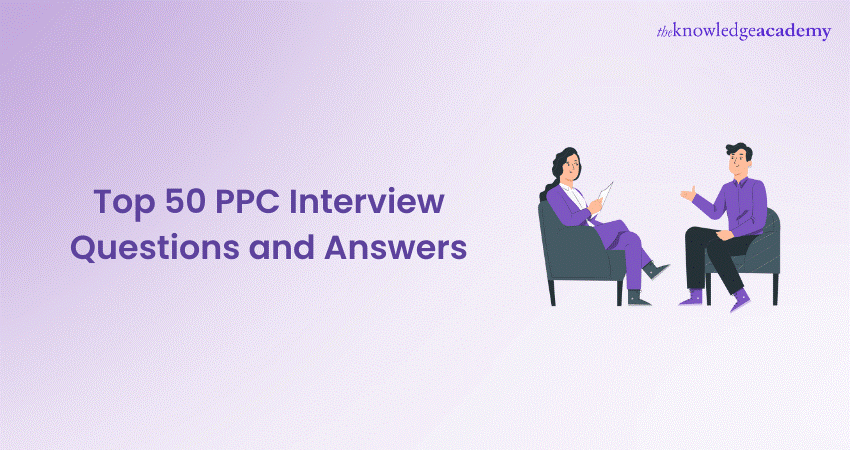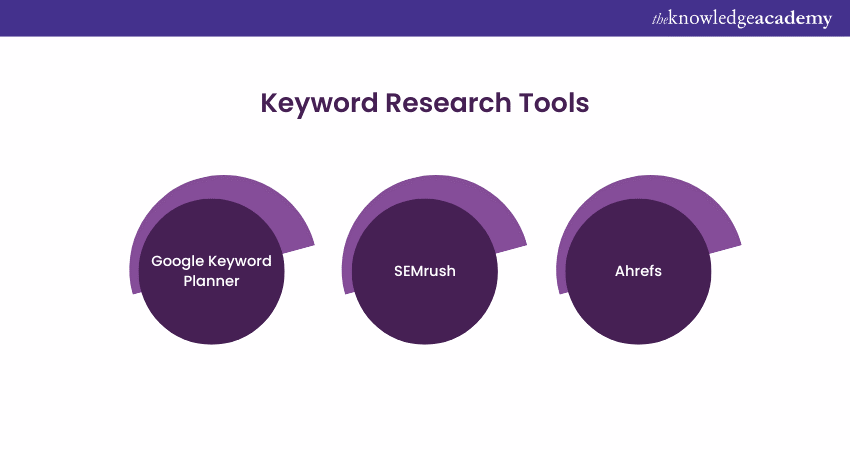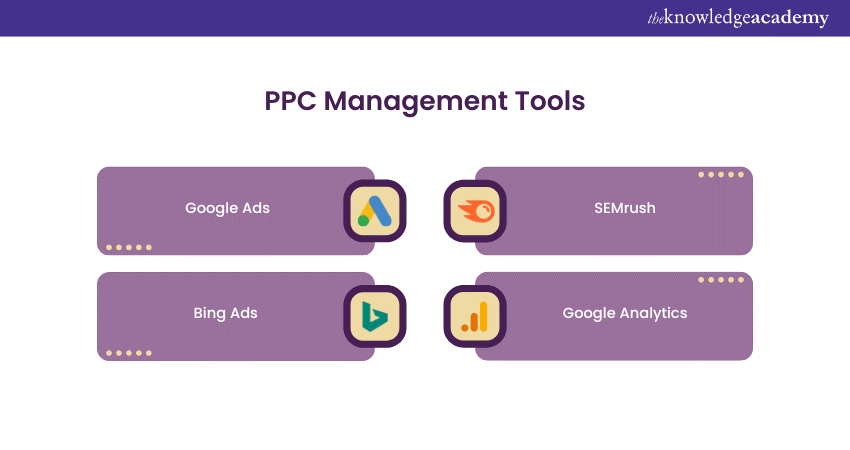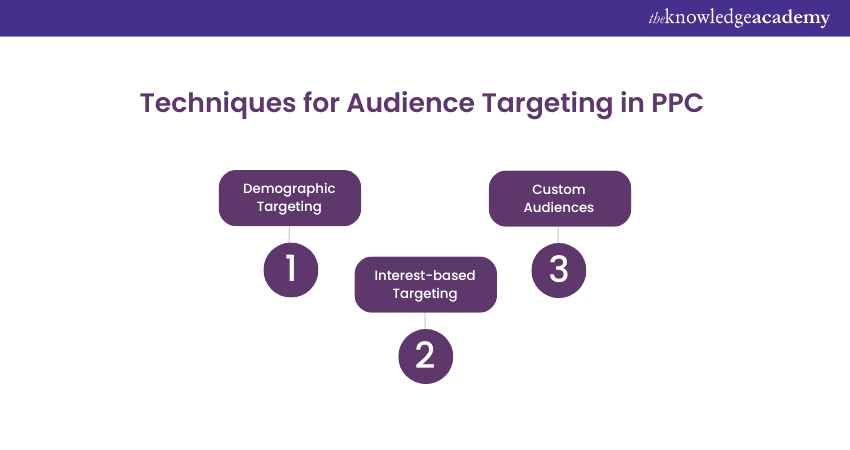We may not have the course you’re looking for. If you enquire or give us a call on 800969236 and speak to our training experts, we may still be able to help with your training requirements.
We ensure quality, budget-alignment, and timely delivery by our expert instructors.

If you aspire to work as a Pay Per Click (PPC) professional, it is essential to prepare for interviews by familiarising yourself with common PPC Interview Questions. Preparing interview questions is a good way to boost your chances of success and gain a competitive edge.
According to Indeed, today, there are approximately 2,000 job openings for candidates willing to work as PPC professionals. This high demand implies increased competition in the job market. Further, read this blog to learn about the top 25 PPC Interview Questions and Answers for beginners and professionals. Get prepared to tackle all the questions.
Table of contents
1) Basic PPC Interview Questions for Freshers
2) Intermediate PPC Interview Questions
3) Advanced PPC Interview Questions for Experienced
4) Conclusion
Basic PPC Interview Questions for Freshers
These basic questions for freshers will help you understand foundational concepts and build confidence for your interview.
1) What is PPC advertising?
This question assesses your understanding of the basics of PPC advertising.
Here's how you can answer this question:
To Become a PPC Specialist, it's essential to understand that PPC advertising, or Pay-Per-Click advertising, is a model where advertisers pay a fee each time their ad is clicked. It allows businesses to buy visits to their site rather than earning them organically.”
2) How do you create a PPC campaign?
This question assesses your process for developing effective PPC campaigns.
Here's how you can answer this question:
“I create a PPC campaign by defining campaign goals, conducting keyword research, creating targeted ad copy, selecting relevant landing pages, setting a budget, and launching the campaign while ensuring proper tracking and analytics are in place.”
3) What is a Quality Score in PPC?
This question assesses your knowledge of important PPC metrics.
Here's how you can answer this question:
“Quality Score is a metric used by search engines to determine the relevance and quality of ads, keywords, and landing pages. It affects ad rank and cost per click, so a higher score typically leads to lower costs and better ad placements.”
4) How do you conduct keyword research?
This question assesses your approach to finding effective keywords.

Here's how you can answer this question:
“I conduct keyword research by using tools like Google Keyword Planner, SEMrush, and Ahrefs to identify high-volume and low-competition keywords. I also analyse competitors and utilise long-tail keywords to reach specific audiences.”
5) What are negative keywords, and why are they important?
This question assesses your understanding of keyword management.
Here's how you can answer this question:
“Negative keywords are terms you exclude from your campaigns to prevent ads from appearing for irrelevant searches. They are crucial for optimising ad spend, improving CTR, and ensuring your ads reach the right audience.”
6) How do you measure PPC campaign success?
This question assesses your ability to evaluate campaign performance.
Here's how you can answer this question:
“I measure PPC campaign success by analysing key metrics such as CTR, conversion rate, CPA, and ROI. Regularly reviewing these metrics helps me adjust strategies and improve campaign performance.”
7) What is remarketing, and how does it work?
This question assesses your understanding of advanced PPC strategies.
Here's how you can answer this question:
“Remarketing is a strategy that targets users who have previously visited your website but did not convert. It works by displaying tailored ads to these users as they browse other sites, reminding them of the products or services they viewed.”
8) How do you write effective ad copy for PPC?
This question assesses your copywriting skills for advertisements.
Here's how you can answer this question:
“I write effective ad copy by focusing on clear, compelling language that includes relevant keywords, a strong call to action, and unique selling points. Testing different headlines and descriptions also helps identify the best-performing copy.”
9) What is the difference between CPC and CPM?
This question assesses your knowledge of pricing models in PPC.
Here's how you can answer this question:
“CPC, or Cost-Per-Click, is a pricing model where advertisers pay each time someone clicks their ad, while CPM, or Cost-Per-Mille, charges advertisers for every thousand impressions. The choice depends on campaign objectives.”
10) What tools do you use for PPC management?
This question assesses your familiarity with PPC tools.

Here's how you can answer this question:
“I use tools like Google Ads, Bing Ads, SEMrush, and Google Analytics for PPC management. These tools help me manage bids, track performance, and optimise campaigns effectively.”
11) How do you optimise landing pages for PPC?
This question assesses your understanding of landing page effectiveness.
Here's how you can answer this question:
“I optimise landing pages for PPC by ensuring they are relevant to the ad copy, load quickly, have clear calls to action, and are mobile-friendly. Regular A/B testing helps identify improvements to increase conversions.”
12) What is the importance of A/B testing in PPC?
This question assesses your knowledge of testing methodologies.
Here's how you can answer this question:
“A/B testing is important in PPC as it allows me to compare two versions of an ad or landing page to determine which performs better. This data-driven approach helps optimise campaigns for better results.”
13) How do you handle underperforming ads?
This question assesses your problem-solving skills in PPC.
Here's how you can answer this question:
“I handle underperforming ads by analysing performance metrics to identify issues, such as low CTR or high CPA. Based on the analysis, I may adjust targeting, modify ad copy, or refine keywords to improve performance.”
14) What is your approach to budget management in PPC?
This question assesses your ability to manage resources effectively.
Here's how you can answer this question:
“My approach to budget management in PPC involves setting clear budgets for each campaign based on goals and historical performance. I regularly monitor spending and adjust bids to ensure optimal use of the budget while maximising ROI.”
15) What factors do you consider when selecting keywords?
This question assesses your criteria for keyword selection.
Here's how you can answer this question:
“When selecting keywords, I consider search volume, competition level, relevance to the business, and user intent. Choosing a mix of short-tail and long-tail keywords helps target different stages of the customer journey.”
16) How do you adjust bids for PPC campaigns?
This question assesses your bidding strategy in PPC.
Here's how you can answer this question:
“I adjust bids based on performance data, competition, and specific campaign goals. For high-performing keywords, I may increase bids to gain more visibility, while reducing bids for underperforming keywords to manage costs.”
17) What is the role of ad extensions in PPC?
This question assesses your understanding of enhancing ads.
Here's how you can answer this question:
“Ad extensions are additional information that enhances PPC ads, providing users with more reasons to click. They can include site links, call buttons, or location information, improving visibility and CTR.”
18) How do you ensure ads comply with platform policies?
This question assesses your knowledge of compliance in advertising.
Here's how you can answer this question:
“I ensure ads comply with platform policies by regularly reviewing guidelines and staying updated on any changes. I also conduct internal reviews of ads before launching to catch any potential issues.”
19) What strategies do you use for competitor analysis?
This question assesses your approach to market research.
Here's how you can answer this question:
“I use tools like SEMrush and SpyFu to analyse competitors’ keywords, ad copy, and overall strategy. This information helps me identify opportunities and threats to refine my own PPC strategies.”
20) How do you manage multiple PPC accounts?
This question assesses your organisational skills in PPC management.
Here's how you can answer this question:
“I manage multiple PPC accounts by using a centralised dashboard for tracking performance, setting up standardised reporting processes, and scheduling regular reviews to ensure each account aligns with overall business goals.”
Master PPC strategies and drive results with our Pay Per Click (PPC) Training. Join now to lead in paid search!
Intermediate PPC Interview Questions
Intermediate PPC Interview Questions dive deeper into the strategic and analytical aspects of campaign management. These questions assess your ability to optimize campaigns, analyse performance, and implement best practices for successful PPC advertising.
21) What are the benefits of using remarketing?
This question assesses your understanding of remarketing advantages.
Here's how you can answer this question:
“Remarketing allows for targeted advertising to users who have previously interacted with your site, increasing brand recall and conversion rates. It is an effective way to re-engage potential customers and enhance ROI.”
22) How do you approach mobile PPC advertising?
This question assesses your strategy for mobile advertising.
Here's how you can answer this question:
“I approach mobile PPC advertising by ensuring ads are optimised for mobile devices, including concise copy and mobile-friendly landing pages. I also utilise location targeting to reach users on the go.”
23) How do you deal with ad fatigue?
This question assesses your ability to manage ad performance.
Here's how you can answer this question:
“I deal with ad fatigue by regularly refreshing ad creatives and copying to keep content engaging. A/B testing helps identify when ads are losing effectiveness, allowing for timely updates.”
24) What is the difference between broad match and exact match keywords?
This question assesses your understanding of keyword matching options.
Here's how you can answer this question:
“Broad match keywords allow ads to show variations of the keyword, including synonyms and related terms, while exact match keywords show ads only for the exact term. Broad match reaches a wider audience, whereas exact match is more targeted.”
25) How do you use data analysis in PPC?
This question assesses your analytical skills in PPC campaigns.
Here's how you can answer this question:
“I use data analysis in PPC to monitor performance metrics, track conversions, and identify trends. By analysing this data, I can make informed decisions to optimise campaigns and improve overall results.”
26) How do you ensure ad relevance?
This question assesses your approach to maintaining relevance in ads.
Here's how you can answer this question:
“I ensure ad relevance by aligning ad copy with the targeted keywords and the content of the landing page. Regularly reviewing and updating ads based on performance data helps maintain high relevance.”
27) What techniques do you use for audience targeting in PPC?
This question assesses your targeting strategies.

Here's how you can answer this question:
“I use techniques such as demographic targeting, interest-based targeting, and custom audiences to reach specific user segments. Utilising retargeting helps engage users who have shown interest in the brand.”
28) How do you handle budget constraints in PPC?
This question assesses your resource management skills.
Here's how you can answer this question:
“I handle budget constraints in PPC by prioritising high-performing campaigns and reallocating budgets from underperforming ones. I also explore cost-effective targeting options to maximise results within the budget.”
29) How do you keep up with PPC trends and changes?
This question assesses your commitment to ongoing learning.
Here's how you can answer this question:
“I keep up with PPC trends and changes by following industry blogs, attending webinars, and participating in relevant forums. Staying informed helps me adapt strategies and maintain competitive advantage.”
30) What is your experience with Google Ads?
This question assesses your familiarity with the Google Ads platform.
Here's how you can answer this question:
“I have extensive experience with Google Ads, having managed multiple campaigns across various industries. I am proficient in utilising all features, from keyword planning to tracking conversions.”
31) How do you set goals for PPC campaigns?
This question assesses your goal-setting process.
Here's how you can answer this question:
“I set SMART goals for PPC campaigns, ensuring they are Specific, Measurable, Achievable, Relevant, and Time-bound. This framework helps align campaigns with broader business objectives and measure success effectively.”
32) How do you approach seasonal advertising in PPC?
This question assesses your strategy for seasonal campaigns.
Here's how you can answer this question:
“I approach seasonal advertising by analysing past performance data to identify trends. I plan campaigns in advance, focusing on relevant keywords and tailored ad copy to capitalise on seasonal interest.”
33) How do you balance brand awareness and direct response in PPC?
This question assesses your strategy for campaign focus.
Here's how you can answer this question:
“I balance brand awareness and direct response by creating separate campaigns targeting each objective. Brand awareness campaigns focus on visibility and engagement, while direct response campaigns aim for immediate conversions.”
34) What is the role of conversion tracking in PPC?
This question assesses your understanding of performance measurement.
Here's how you can answer this question:
“Conversion tracking is essential in PPC as it allows me to measure the effectiveness of campaigns. By tracking conversions, I can evaluate ROI and make data-driven adjustments to optimise performance.”
35) How do you manage ad schedules in PPC?
This question assesses your advertising scheduling strategies.
Here's how you can answer this question:
“I manage ad schedules by analysing performance data to determine peak engagement times. I set ads to run during these optimal hours to maximise visibility and effectiveness.”
36) How do you use geotargeting in PPC?
This question assesses your targeting strategies based on location.
Here's how you can answer this question:
“I use geotargeting in PPC to reach specific geographic locations, allowing me to tailor ads to local audiences. This approach improves relevance and increases the chances of conversion.”
37) What is your approach to cross-channel PPC advertising?
This question assesses your strategy for integrated campaigns.
Here's how you can answer this question:
“My approach to cross-channel PPC advertising involves creating cohesive campaigns across platforms, ensuring messaging aligns with overall branding. I use analytics to track performance across channels for optimised results.”
38) How do you leverage social media in PPC?
This question assesses your ability to integrate social media with PPC strategies.
Here's how you can answer this question:
“I leverage social media in PPC by creating targeted ads on platforms like Facebook and Instagram, where I can reach specific audiences. Integrating social media strategies enhances overall campaign effectiveness.”
39) What is the importance of ad copy testing?
This question assesses your approach to refining ad content.
Here's how you can answer this question:
“Ad copy testing is important as it allows me to identify which messages resonate best with the audience. By continuously testing and refining copy, I can improve click-through rates and conversions.”
40) How do you handle competitor bids in PPC?
This question assesses your competitive strategy in bidding.
Here's how you can answer this question:
“I handle competitor bids by monitoring their strategies and adjusting my bids accordingly. I focus on maintaining a competitive edge while ensuring cost-effectiveness in my bidding strategy.”
Advanced PPC Interview Questions for Experienced
In this section, we will dive into advanced PPC Interview Questions designed to help you test your strategic expertise and technical skills in pay-per-click advertising.
41) What are some common mistakes in PPC management?
This question assesses your understanding of pitfalls to avoid.
Here's how you can answer this question:
“Common mistakes in PPC management include poor keyword selection, lack of ad testing, ignoring negative keywords, and failing to track conversions. I focus on avoiding these pitfalls to optimise campaign performance.”
42) How do you manage customer feedback in PPC campaigns?
This question assesses your approach to handling user input.
Here's how you can answer this question:
“I manage customer feedback in PPC campaigns by actively monitoring comments and reviews. I use this feedback to improve ad targeting and refine messaging, ensuring campaigns resonate better with the audience.”
43) What strategies do you use for improving click-through rates (CTR)?
This question assesses your approach to enhancing engagement.
Here's how you can answer this question:
“I improve CTR by focusing on compelling ad copy, using targeted keywords, and including strong calls to action. Regularly testing different ad formats and extensions also helps increase engagement.”
44) How do you address low conversion rates?
This question assesses your problem-solving skills in PPC.
Here's how you can answer this question:
“I address low conversion rates by analysing landing page performance, reviewing ad copy for clarity and relevance, and ensuring a seamless user experience. A/B testing helps identify specific issues for improvement.”
45) What is your experience with display advertising?
This question assesses your familiarity with display ad campaigns.
Here's how you can answer this question:
“I have experience with display advertising, having managed campaigns that utilise visually engaging banner ads across various networks. I focus on targeting the right audience to enhance brand visibility.”
46) How do you approach bidding strategies in PPC?
This question assesses your understanding of bidding dynamics.
Here's how you can answer this question:
“I approach bidding strategies by evaluating campaign objectives and adjusting bids based on performance data. I experiment with automated bidding options to optimise results while managing costs effectively.”
47) What are the best practices for writing effective headlines in PPC ads?
This question assesses your copywriting skills for headlines.
Here's how you can answer this question:
“Best practices for writing effective headlines include using clear and direct language, incorporating keywords, and creating a sense of urgency. A/B testing different headlines helps identify what resonates best with the audience.”
48) How do you keep your PPC skills updated?
This question assesses your commitment to professional development.
Here's how you can answer this question:
“I keep my PPC skills updated by participating in relevant online courses, attending industry conferences, and following thought leaders in the field. This continuous learning helps me stay ahead of trends.”
49) How do you handle client expectations in PPC management?
This question assesses your communication skills with clients.
Here's how you can answer this question:
“I handle client expectations in PPC management by setting clear goals and regularly updating them on campaign performance. Transparent communication helps build trust and ensures alignment with their objectives.”
50) What are your thoughts on automation in PPC?
This question assesses your perspective on technological advancements.
Here's how you can answer this question:
“I believe automation in PPC can enhance efficiency and improve performance. Automated bidding and reporting save time, allowing me to focus on strategy and creative aspects of campaigns.”
Unlock the power of strategy! Elevate your skills with our Strategic Marketing Course. Shape the future of brands—start today!
Conclusion
In conclusion, preparing for a PPC Interview can be both exciting and challenging. By familiarising yourself with the top PPC Interview Questions and crafting thoughtful answers, you set yourself up for success in showcasing your expertise and passion for digital marketing. Remember to incorporate PPC Tips such as optimising ad copy, refining audience targeting, and analysing performance metrics to demonstrate your practical knowledge. As the digital landscape evolves, staying updated on PPC strategies and trends will keep you ahead of the curve.
Transform your ideas into compelling content! Learn the art of content marketing and boost your career. Join our Content Marketing Course today!
Upcoming Digital Marketing Resources Batches & Dates
Date
 Pay Per Click (PPC) Training
Pay Per Click (PPC) Training
Fri 11th Apr 2025
Fri 13th Jun 2025
Fri 15th Aug 2025
Fri 10th Oct 2025
Fri 12th Dec 2025






 Top Rated Course
Top Rated Course



 If you wish to make any changes to your course, please
If you wish to make any changes to your course, please


